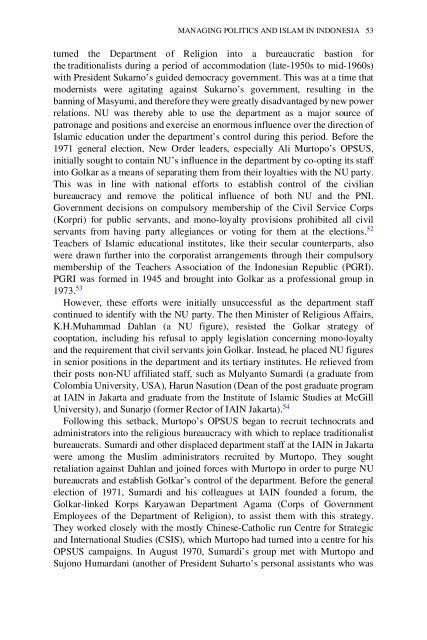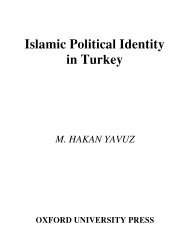You also want an ePaper? Increase the reach of your titles
YUMPU automatically turns print PDFs into web optimized ePapers that Google loves.
MANAGING POLITICS AND ISLAM IN INDONESIA 53turned the Department of Religion <strong>in</strong>to a bureaucratic bastion forthe traditionalists dur<strong>in</strong>g a period of accommodation (late-1950s to mid-1960s)with President Sukarno’s guided democracy government. This was at a time thatmodernists were agitat<strong>in</strong>g aga<strong>in</strong>st Sukarno’s government, result<strong>in</strong>g <strong>in</strong> thebann<strong>in</strong>g of Masyumi, <strong>and</strong> therefore they were greatly disadvantaged by new powerrelations. NU was thereby able to use the department as a major source ofpatronage <strong>and</strong> positions <strong>and</strong> exercise an enormous <strong>in</strong>fluence over the direction of<strong>Islam</strong>ic education under the department’s control dur<strong>in</strong>g this period. Before the1971 general election, New Order leaders, especially Ali Murtopo’s OPSUS,<strong>in</strong>itially sought to conta<strong>in</strong> NU’s <strong>in</strong>fluence <strong>in</strong> the department by co-opt<strong>in</strong>g its staff<strong>in</strong>to Golkar as a means of separat<strong>in</strong>g them from their loyalties with the NU party.This was <strong>in</strong> l<strong>in</strong>e with national efforts to establish control of the civilianbureaucracy <strong>and</strong> remove the political <strong>in</strong>fluence of both NU <strong>and</strong> the PNI.Government decisions on compulsory membership of the Civil Service Corps(Korpri) for public servants, <strong>and</strong> mono-loyalty provisions prohibited all civilservants from hav<strong>in</strong>g party allegiances or vot<strong>in</strong>g for them at the elections. 52Teachers of <strong>Islam</strong>ic educational <strong>in</strong>stitutes, like their secular counterparts, alsowere drawn further <strong>in</strong>to the corporatist arrangements through their compulsorymembership of the Teachers Association of the <strong>Indonesia</strong>n Republic (PGRI).PGRI was formed <strong>in</strong> 1945 <strong>and</strong> brought <strong>in</strong>to Golkar as a professional group <strong>in</strong>1973. 53However, these efforts were <strong>in</strong>itially unsuccessful as the department staffcont<strong>in</strong>ued to identify with the NU party. The then M<strong>in</strong>ister of Religious Affairs,K.H.Muhammad Dahlan (a NU figure), resisted the Golkar strategy ofcooptation, <strong>in</strong>clud<strong>in</strong>g his refusal to apply legislation concern<strong>in</strong>g mono-loyalty<strong>and</strong> the requirement that civil servants jo<strong>in</strong> Golkar. Instead, he placed NU figures<strong>in</strong> senior positions <strong>in</strong> the department <strong>and</strong> its tertiary <strong>in</strong>stitutes. He relieved fromtheir posts non-NU affiliated staff, such as Mulyanto Sumardi (a graduate fromColombia University, USA), Harun Nasution (Dean of the post graduate programat IAIN <strong>in</strong> Jakarta <strong>and</strong> graduate from the Institute of <strong>Islam</strong>ic Studies at McGillUniversity), <strong>and</strong> Sunarjo (former Rector of IAIN Jakarta). 54Follow<strong>in</strong>g this setback, Murtopo’s OPSUS began to recruit technocrats <strong>and</strong>adm<strong>in</strong>istrators <strong>in</strong>to the religious bureaucracy with which to replace traditionalistbureaucrats. Sumardi <strong>and</strong> other displaced department staff at the IAIN <strong>in</strong> Jakartawere among the Muslim adm<strong>in</strong>istrators recruited by Murtopo. They soughtretaliation aga<strong>in</strong>st Dahlan <strong>and</strong> jo<strong>in</strong>ed forces with Murtopo <strong>in</strong> order to purge NUbureaucrats <strong>and</strong> establish Golkar’s control of the department. Before the generalelection of 1971, Sumardi <strong>and</strong> his colleagues at IAIN founded a forum, theGolkar-l<strong>in</strong>ked Korps Karyawan Department Agama (Corps of GovernmentEmployees of the Department of Religion), to assist them with this strategy.They worked closely with the mostly Ch<strong>in</strong>ese-Catholic run Centre for Strategic<strong>and</strong> International Studies (CSIS), which Murtopo had turned <strong>in</strong>to a centre for hisOPSUS campaigns. In August 1970, Sumardi’s group met with Murtopo <strong>and</strong>Sujono Humardani (another of President Suharto’s personal assistants who was




